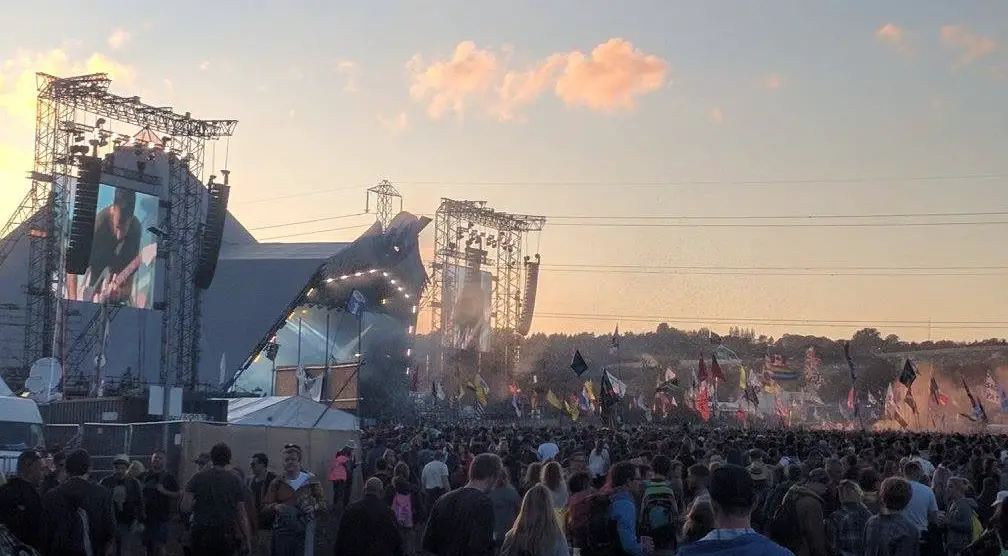When the coronavirus outbreak first spread to the west, one of the first moments that foreshadowed the year to come was a festival cancellation. Seven days before hundreds of thousands of people descended on Austin, Texas, SXSW’s organisers announced the 2020 edition would no longer be going ahead. So began a ripple of festivals around the world slowly following suit.
At the time, it seemed unimaginable that no major festivals would go ahead this year. Some, like Coachella, tried postponing til later in the year. Others, like Iceland Airwaves, took hope from low cases in their countries and forged on, only to be scuppered by stricter measures designed to stymie the spread of the virus. In festivals’ places were headlines of scrapped events, doomy predictions for the future and plans for how the live industry could get back on its feet.
With music fans across the globe itching to get back in a field or sticky venue, the latter offered some hope. But, as promoters continue to talk about ideas like testing on entry and line-ups gradually get announced, what will festival season 2021 look like should our favourite weekenders be able to go ahead?
The answer is complicated, but it’s almost guaranteed that things won’t be “normal”, whatever that means these days. Social distancing and mask-wearing have ruled 2020 and, much as we now “distance date” or do “distanced drinks”, we can expect to be keeping strictly two metres apart from everyone else at festivals next year too.
“There’s so many iterations being talked about, but what we can say at the moment is that we’re looking at a socially distanced event,” says Becky Ayres, managing director of Liverpool Sound City. “We’re a multi-venue festival so we work with a lot of venues that themselves are in preparation for opening and having social distancing measures in place, as well as other COVID-19 preventative measures.”
To allow for bodies to be spread out rather than clamouring together in the pit, though, the capacity will need to be reduced. “Our usual capacity is about 5,000 and we’re looking at a third of that or potentially even half,” Ayres explains. “We’ve got tickets on sale at the moment and we’ve actually been really encouraged by people buying because I think there’s a lot of people that really want things to happen. If we’re going to go ahead – which we’re very much planning to – then reducing the capacities is the safest option.”
Social distancing might work in small venues or one controlled outdoor space, like the Virgin Money Unity Arena in Newcastle, which held a series of “COVID-safe” gigs in September and housed attendees in their own little pens. It becomes harder to see how it might work on a festival site where you’re walking from stage to stage, often in a big crowd. One-way circuits to the bar and toilets, with distanced areas in places where queuing is likely, could help but festival-goers would also be required to be on their best behaviour – which could be difficult at events that are normally the opposite of orderly and calm.
“In terms of social distancing, it doesn’t work for festivals – especially grassroots, greenfield festivals like ours,” agrees Lauren Down, managing director of Dorset’s End Of The Road. “It’s not practical or realistic to expect that people would maintain social distancing in that kind of environment. Can you imagine the euphoria of watching live music again, along with the beers you’ve probably been drinking all afternoon kicking in, and being able to resist hugging and dancing with anyone and everyone around you?!”
Down notes that while there are “plenty of realistic measures” that can be introduced to manage “queuing, entry, egress, pinch points, access to facilities and crowd flow”, festivals will need the Government’s help as well as rapid testing and vaccination to be able to operate at 100 percent.
Mass testing at festival gates, of course, has taken up a lot of column inches over the last few months. Festival Republic’s Melvin Benn has suggested they could operate testing schemes that require anyone wanting to step through their gates to test negative on arrival. Greg Parmley, chair of the LIVE organisation – which features the Association Of Independent Festivals (AIF) and Association Of Festival Organisers (AFO) under its umbrella – says that tactic will be “very, very important” this year.
“We’ve seen in the last month the cost of the tests and the speed with which you can get a result is dropping dramatically,” he explains. “So I think by the start of festival season next year, we will have very accurate and cheap testing available and, I imagine, before going into a festival next year that any festival-goer will be asked to take a coronavirus test.”
While testing could improve by next summer, right now it has some crucial flaws. There are currently two types of test in use to detect COVID-19 – molecular tests, which are used in hospitals and are more expensive; and antigen tests, the cheaper and less accurate option. For the latter, “every test is different”, says Pia MacDonald PhD, infectious disease epidemiologist and senior director of public health at RTI International, a nonprofit research institute. “If I take 10 antigen tests in a day, the results are not guaranteed to tell me the same thing because there’s no generalised cut[-off] points on how much antigen is considered a positive,” she explains. “It’s not regulated.”
Antigen tests would be the most likely to be used for a mass event because of their speed and cost, but only reflect the amount of virus present in your body at that moment. Although available data from such tests is still in its early stages, MacDonald notes it currently shows that you “really have to be symptomatic for an antigen test to pick up that you’re affected”.
Given that some people can catch COVID-19 but be asymptomatic and none the wiser, or that it’s believed that you are at your most contagious two to three days before you develop symptoms, putting too much faith in testing alone could be incredibly dangerous. You only need to look at the situation in the White House – where the Trump administration relied on regular testing to excuse them from other preventative measures, only for the virus to thrive on the property – to see the potential for disaster. “Testing alone as a strategy doesn’t work,” says MacDonald. “Festivals would need to do work on physical distancing and masking as well – at a minimum.”
Testing every day would make things “slightly better” – if used in conjunction with social distancing and masks too – but would still leave a risk of transmission. Carrying that out might be easy at an event where everyone leaves at the end of the day and comes back the next morning, but would provide a considerable challenge for somewhere like Glastonbury where accommodation and festival space blur into one.*
Since writing this article, Glastonbury Festival has now made the difficult decision to cancel for a second year in a row which has put a layer of doubt across the industry. But elsewhere, festivals such as Download, say they’re still ploughing ahead with plans for a June event.
It’s not just the festival site that needs to be considered, though, but the local communities around them. An influx of people from all areas could bring the virus to the host locality and spread it both there and into other areas. When the Sturgis motorcycle rally was held in South Dakota in August, the state had relatively low cases but saw a huge spike after nearly half a million people attended the event. Afterwards, cases in surrounding states also surged, with more than 330 cases directly linked to the rally. Experts said there were likely many, many more.
It should be pointed out that attendees of the rally were only encouraged – not enforced – to wear masks and held large gatherings at indoor locations as well as the outdoor event. However, with non-camping festivals, fans will be moving around city centres, staying in hotels, possibly popping into shops or heading to bars after the night’s music is over. Even with all the precautions there’s still a risk. “In a pandemic, there’s no such thing as safe,” says MacDonald. “What we’re constantly talking about is mitigating risk was much as possible. The idea of bringing lots of people together from various places is the worst thing to do in the middle of a pandemic.”
For End Of The Road, Down says addressing their local community’s concerns has always been a priority – pandemic or not. “This is the only way to truly understand how our presence affects them and the community, and to learn what we can do to improve anything from our side,” she explains. “Our approach to assessing and looking to minimise the risk an influx of people into the area could have due to COVID will be the same. It will also include greater consultation and communication with local authorities and [scientific advisory groups].”
Ayres agrees that working in tandem with Government bodies is key to making events as safe as possible. “The public health team in Liverpool is really good, and they’re really proactive with helping speak to the community locally,” she says. “We always speak to the council and we always have them on board for licensing, so it’s about going a step further with that relationship to talk about the health aspects and just make sure that there are those protocols in place.”
Parmley argues, though, that festivals won’t be taking place if areas have a high number of infections in the first place. “It’s not the case that people are going to try to put on festivals in exactly the same conditions that we’re in right now because that’s unrealistic,” he says. “All these measures that are happening now and over Christmas will hopefully have been successful with getting the R number down to the point where the risk is much lower and festivals will be going ahead with mass testing and a whole load of mitigation measures in place as well.”
Should that be the case then, once you’re inside with your mask on, in your own two-metre space, the line-up that you’re able to watch could also be affected by the pandemic. When Sound City was planning to go ahead with safety measures in place this year, organisers announced there would be no international acts on the bill. It’s a move they’re keeping in place for 2021. “International artists are such a key part of Sound City because we showcase a huge number of them,” says Ayres, pointing to Christine And The Queens, The Temper Trap and John Talabot as three examples of artists they’ve given slots to early on in their careers. “But if people have to quarantine on any side it’ll make it tough.”
That doesn’t mean artists from abroad will be shut out entirely. When Sound City was forced to cancel this year, the company set up their own online platform called Guest House on which acts from around the world can make money from live-streamed performances. “There might be a way we can do a hybrid event with that,” Ayres suggests. Some of the rare festivals that did go ahead in 2020, like Estonia’s Tallinn Music Week, allowed for both on-site and online participation – something that could be built upon to allow international artists the chance to perform still, while offering UK acts more opportunity to play in-person shows.
With the first coronavirus vaccine being rolled out in the UK, will all of these measures and ideas be unnecessary by the time next summer rolls around? You might think so, but the reality is more complicated. The typical demographic of music festival audiences is not going to be one of the first groups in line to be vaccinated – unless they have a condition that puts them at risk or they work on the frontline or in essential services, they’re going to be last. Experts have estimated it will take a year or longer to get everyone in the country vaccinated, with all of the vaccines either approved or near approval so far requiring two doses to be effective enough. There’s also the unknown matter of how long immunity will last, which will likely differ from vaccine to vaccine.
The situation in the UK isn’t the only thing that matters to make a music festival safe. If bands and fans are travelling from other parts of the world, the vaccine will also need to be readily available in their countries to prevent transmission either in the UK or when they return home. “For it to be a safe new world, a vaccine has to be available to everyone everywhere,” MacDonald says.
She notes that even if that is the case, there’s another problem that could arise. “We’re at a situation in the United States where there may be up to 50 percent of the population that, even if the vaccine were available, would choose not to take it,” she explains. A recent YouGov poll found 21 percent of UK citizens wouldn’t take the vaccine straight away either – although half of that number said that was because they wanted to see if it was safe first. “As long as there’s pockets of people who don’t get vaccinated or don’t have access to the vaccine, we’re always – in some sense – going to be vulnerable as a society.”
Some might argue that, as young people aren’t affected “as badly” by COVID-19 as older, more at-risk groups, whether they’re vaccinated or not isn’t so much of an issue. “There’s a lot of danger in that kind of thinking,” says MacDonald. “If they were going to a different planet to have the music festival and live on that planet, that’d be one thing.” Unless Elon Musk severely discounts SpaceX seats, though, we’re stuck on Earth where, once a festival is over, crowds will go back to their daily lives, going to work and supermarkets, potentially coming into contact with vulnerable, unvaccinated people.
Regardless of what vaccines are available or what mitigation measures festivals adopt to keep their audiences safe, the Government providing all necessary assistance to help events will be vital. Currently, it looks like they’re willing to listen – in November, the Department of Culture, Media and Sport launched a select committee to assess what support festivals need to survive in 2021 and beyond. Parmley’s LIVE organisation have also been working with DCMS and Public Health England to develop planning guidance that will give support and advice on operating safer events.
“We’re also asking for festival license fees to be rolled over from this year to next year and for festivals to be exempt from the agricultural business rate system as well, which would save money,” he says. “We’re asking for the reduced cultural VAT rate to be extended from the end of March for another three years too. It was really a key support measure that the Government put into place earlier this year by dropping VAT on tickets from 20 percent to five percent. But the irony is that there are very few people selling tickets at the moment so there’s no point it expiring in March, when it’s meant to. We really want to make sure that’s extended for another three years so that the festival industry and the live music industry can really benefit from it and get back on its feet quickly.”
Ayres adds that it’s key for local authorities to be “empowered” by the Government. “When councils can actually work with the right experts and officials who are well versed in health and specifically around large-scale events, then there’ll be less red tape,” she explains.
She also points to a scheme that was called for in October that would see the Government underwrite insurance plans for festivals. “Not many people tended to have cancellation insurance because over the last five-10 years the premiums have gone up so much, it’s often too expensive and the cost outweighs the benefit. For anyone that did have pandemic insurance, COVID-19 wasn’t covered – or that’s what the insurers argued. I think the premiums [for a Government scheme] would be pretty high again, but it might be viable for some promoters.”
More funding could also be key to help festivals make it through, particularly if large events require social distancing next summer. While Sound City might be planning to reduce their capacity, Down says End Of The Road and other festivals will struggle to make that work from a business perspective. “The economy of scale for most festivals means reducing capacity is not a financially viable answer,” she explains. While she notes it will be tough to balance costs from additional safety measures with the potential for lower profits and the losses of 2020, there is hope. “This year has shown our industry to be overall strong, resourceful and capable of surviving the toughest of circumstances. We’re creative problem solvers, so we’ll make it happen.”
With SXSW already announced as a virtual event, it seems likely that some festivals could opt for less traditional iterations in 2021. Ayres says that Sound City are looking at the possibility of being completely online if absolutely necessary, while MacDonald has some ideas on how festival organisers can still run some semblance of their events that will also go some way to lowering risks.
“[We’re going to be living with this for] years – I would say more than two and less than 10,” she says. “At some point, it’ll get safer and safer to hold these kinds of events but, in the meantime, we need to find different ways to do festivals. Whether that’s smaller gatherings that are really restricted to location and it’s the musicians that move around [from site to site], we’re going to have to find new ways to do what we enjoy doing for the time being. Because it’s going to be a while, it’s worth spending some effort on rethinking the new normal rather than just trying to get to what we consider was normal before.”
While it seems like festival planning is going full steam ahead for 2021, don’t expect the resulting events to look like your typical three-day riot of madness and mayhem. Should festival season be able to go ahead, though, we’ll not take being reunited in a field somewhere for granted.







